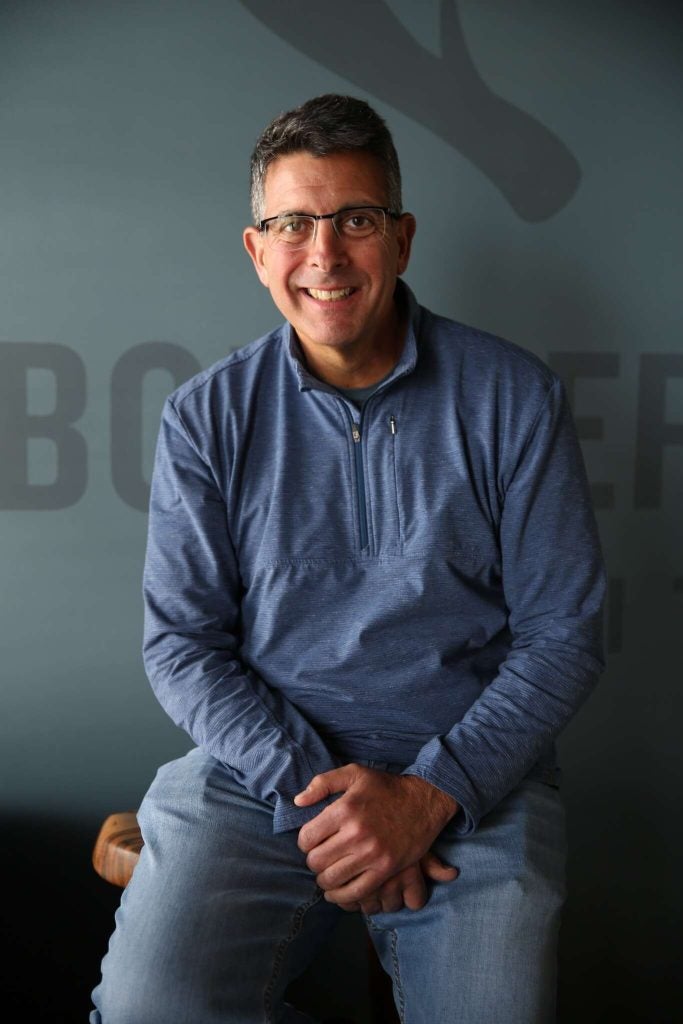Veteran McCourt School alum awarded AARP Purpose Prize
Ken Falke (MPM’11) is one of five recipients of AARP’s Purpose Prize, which is awarded to people aged 50 or older who are using their life experiences to make a difference.
Ken Falke (MPM’11), a 21-year veteran of the U.S. Navy Special Operations Explosive Ordnance Disposal community and retired master chief petty officer, is the founder and chairman of Boulder Crest Foundation , an organization focused on the wellness teachings of Posttraumatic Growth. In September 2023, Falke was awarded the AARP Purpose Prize, receiving ,000 as well as access to technical assistance for his organization.

In the decade since its founding, the Foundation has facilitated Posttraumatic Growth for nearly 100,000 people through transformative programs, training and education initiatives, research and advocacy. Falke, a serial entrepreneur, and his wife, Julia Falke, founded the nonprofit organization.
During his time in the McCourt School’s Master of Policy Management program at Georgetown University, Falke was “profoundly curious, eminently capable and as committed as they come,” said Dr. Kathy Kretman , director of the Center for Public & Nonprofit Leadership and research professor at McCourt, who taught Ken in her graduate seminar on public leadership.
“After a multi-decade military career and a successful eight-year run as an entrepreneur under his belt, he finally had the time to fulfill one of his dreams — earning a master’s degree, in-person, on a college campus,” she said. “Ken has spent more than two decades in service to his brothers and sisters in arms, and I am thrilled that his hard work and impact are being recognized.”
In his own words, Falke describes his passion for helping people thrive in the aftermath of trauma and why it’s critical to address the invisible wounds of war.
I come from a military and first responder family. One lesson I took from my grandfather and father is that service never stops. It’s on each of us to do what we can to make the world a better place. As a veteran myself, I can’t live in a world where we lose more of my brothers and sisters in the military and first responder communities to suicide each year than we do while they’re in the line of duty. That’s why I’ve created the Boulder Crest Foundation. Over the last 13 years, we’ve helped 67,000 combat veterans, first responders and their families transform their struggles into strength through the science of post-traumatic growth.
The problem I’m trying to solve
Many veterans are struggling with the invisible wounds of war. The U.S. Department of Veterans Affairs estimates that almost 30 percent of the veterans that deployed to Iraq and Afghanistan suffer from PTSD. The evidence is clear when you look at their suicide rates. The average number of veteran suicides per day was almost 17 in 2020, according to the 2022 National Veteran Suicide Prevention Report.
First responders struggle with similar mental health challenges. More police officers and firefighters die every year from suicide than they do in the line of duty. Our goal is to help them transform their struggles into strength through something called posttraumatic growth programs. We call it PATHH — Progressive and Alternative Training for Helping Heroes.
The moment that sparked my passion
In 2010, my wife and I began to host families of wounded warriors at our home in Bluemont, Virginia. We then donated 37 acres of our estate and built the nation’s first privately funded retreat for veterans and their families, opening our doors in September 2013. At an early retreat, I had a wife tell me, “I wish my husband had lost his legs. He’d be treated like a hero. Instead, he has PTSD and is treated like a criminal.” We can’t treat people who fight for this country this way. That was when I knew I had to do something better.
What I wish other people knew
Life stress does not mean that you have a mental health issue. The mental health system in our country is broken. Once you go in, there’s a good chance that you will never come out. The average person gets worse before they get better, if they improve at all. When you don’t feel well, you lose agency, or the ability to take care of yourself. You start to spiral and find it hard to self-regulate. People who can’t do this tend to self-medicate, whether it’s marijuana, mushrooms, LSD or even relying on prescription antidepressants. But for most people, that’s not necessary. They will benefit from healthy lifestyle habits like exercise, eating right and simply being around those who love them. That’s why our programs are based on the science of posttraumatic growth. We believe that you should be able to thrive in the aftermath of trauma.
Why my approach is unique
The Boulder Crest Foundation focuses on posttraumatic growth. It’s based on the work of University of North Carolina-Charlotte psychologists Richard Tedeschi and Lawrence Calhoun. Their work has found that many trauma survivors and their families naturally, once the grieving process is over, tend to get better in life. It can take a long time sometimes. Our goal is to teach people how to achieve this sooner, rather than just waiting on the natural outcome. We bring these brave men and women into our facilities, teach them the science of posttraumatic growth and give them meaningful and tangible goals they can go home and work on so that they get better. The opposite of suicide is to live a great life. We’ve created a program that does just that.
Advice to others who want to make a difference
Be careful. There’s no need to run out to start yet another nonprofit. More isn’t necessarily the answer. We need more people involved in the good ones we already have. Otherwise, it’s confusing to the people we serve. Begin slowly and volunteer at an organization that you think does good work. Get an insider’s view and see if they do what you think they should. If they don’t, then you may want to start a program that helps bridge the gap. There are tens of thousands of nonprofit veteran-related organizations already out there. We really need the ones that already exist to do great work.
